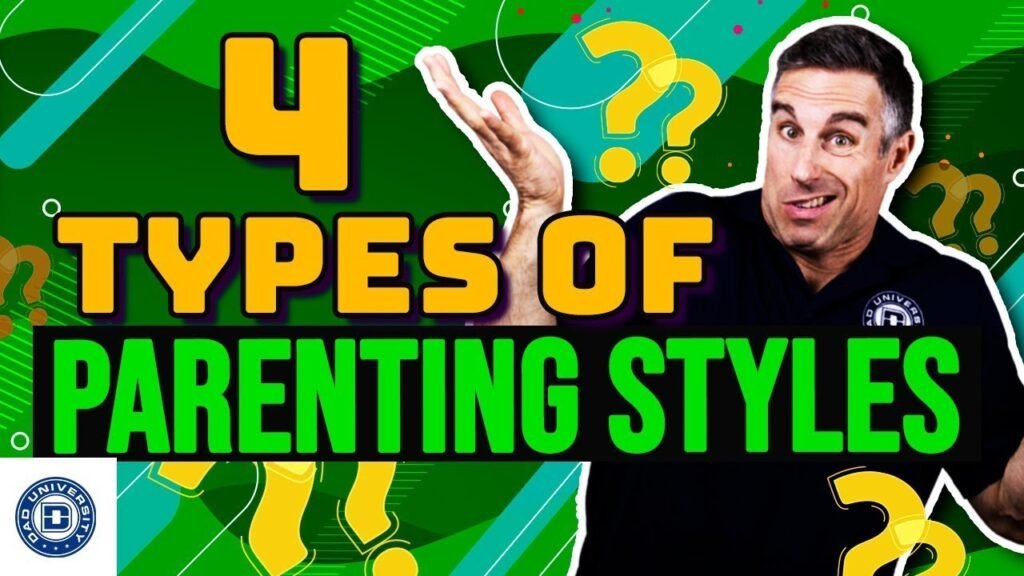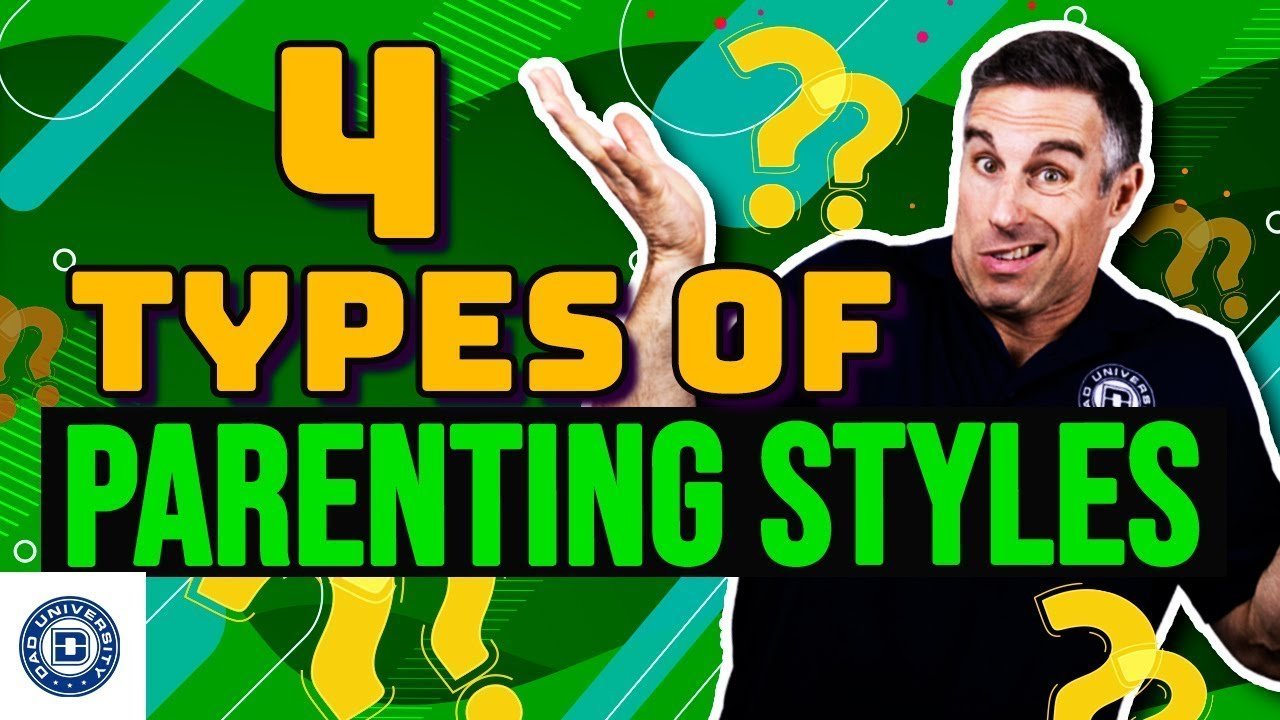In the video titled “The Origins of the Four Major Parenting Styles,” Jason from Dad University explores the different parenting styles and their effects on children. He introduces the four main types of parenting styles: authoritarian, permissive, uninvolved/neglectful, and authoritative, highlighting the distinct characteristics of each style. Jason emphasizes the impact that choosing a parenting style can have on a child’s happiness, social competence, and self-esteem. He also discusses the Dad University parenting program, which focuses on the authoritative parenting style and provides strategies for effective discipline and communication. By understanding the origins and effects of different parenting styles, parents can make informed decisions about the best approach for their child’s well-being.
In this video, Jason offers insight into the various parenting styles and their outcomes on children. He explains how parenting evolves as a child grows and discusses the importance of choosing a parenting style based on the likely outcome for the child. While the authoritarian style may be popular, Jason explores alternative ways to be strict and disciplined in a more positive manner. He also covers the uninvolved/neglectful and permissive parenting styles, highlighting their potential negative effects on a child’s development. Ultimately, Jason advocates for the authoritative parenting style, which combines warmth, responsiveness, high standards, and boundaries, resulting in happier and more capable children.
Authoritarian Parenting
Definition
Authoritarian parenting is a style where parents are strict and have high expectations, particularly when it comes to obedience. They enforce rules without much discussion or explanation and expect their children to follow the rules without question.
Origins
The origins of authoritarian parenting can be traced back to the 1960s when clinical and behavioral psychologist Diana Baumrind defined three different parenting styles. The authoritarian style emphasizes control and a hierarchical relationship between parents and children.
Effects on Children
Children raised with authoritarian parenting tend to associate obedience with love, as they often receive little warmth or nurturing from their parents. While these children may be obedient and follow instructions, they are often less happy, have lower social competence, and report lower self-esteem. It is important to note that the effects of parenting styles can vary based on individual factors, such as a child’s temperament and cultural influences.
Permissive Parenting
Definition
Permissive parenting, also known as indulgent parenting, is characterized by a lack of structure, limits, and boundaries. Parents in this style do not attempt to regulate their child’s behavior and may prioritize being a friend rather than a parental figure.
Origins
The permissive parenting style emerged as a response to the traditional authoritarian style, particularly during the cultural shifts of the 1960s and 1970s. Parents sought to create more open and egalitarian relationships with their children.
Effects on Children
Children raised with permissive parenting often struggle with self-regulation and have difficulty recognizing acceptable behavior. They may have problems with authority, perform poorly in school, and report low levels of happiness. The lack of boundaries and limits can lead to issues with impulse control and may increase susceptibility to substance abuse.
Uninvolved/Neglectful Parenting
Definition
Uninvolved or neglectful parenting is characterized by parents who do not provide the emotional, psychological, or physical needs of their children. They may provide basic necessities, such as food and shelter, but fail to engage in their child’s activities or set rules and boundaries.
Origins
Socioeconomic factors and parental mental health can play a role in the development of uninvolved or neglectful parenting. Lack of support systems and limited resources can contribute to parents’ inability to meet their child’s needs.
Effects on Children
Children raised with uninvolved or neglectful parenting have difficulty forming relationships, lack trust in others, and often struggle to interact with their peers. They may exhibit low self-esteem, experience poor social competence, and have difficulty handling their emotions.

Authoritative Parenting
Definition
Authoritative parenting combines warmth and responsiveness with high standards and boundaries. Parents in this style are both supportive and demanding, establishing rules and expectations while also listening to their child’s feelings and emotions.
Origins
In the 1980s, researchers Eleanor McAbee and John Martin introduced the concept of authoritative parenting, adding it as a fourth style. This style aims to balance the need for discipline with empathy and understanding.
Effects on Children
Children raised with authoritative parenting tend to be happier, more capable, and perform better in school. They are more independent, socially accepted, and have lower rates of anxiety, depression, and substance abuse. The authoritative style promotes self-reliance, confidence, and positive behavior.
Comparison of Parenting Styles
Different Approaches
Each parenting style employs different approaches to discipline and setting boundaries. Authoritarian parents are strict and controlling, permissive parents lack structure and limits, uninvolved parents neglect their child’s needs, while authoritative parents balance support and discipline.
Impact on Happiness
Research consistently shows that children raised with authoritative parents tend to be happier compared to those raised with other parenting styles. The warm and supportive environment of authoritative parenting contributes to the child’s overall well-being and satisfaction.
Impact on Social Competence
Authoritative parenting fosters social competence in children by encouraging autonomy, promoting positive social interactions, and teaching valuable communication skills. Children raised with authoritative parents often have better social skills and are more accepted by their peers.
Impact on Self-esteem
Children raised with authoritative parents tend to have higher levels of self-esteem compared to those raised with authoritarian, permissive, or uninvolved parenting styles. The support, guidance, and validation provided by authoritative parents contribute to their child’s self-confidence.
The Importance of Choosing a Parenting Style
Considering the Likely Outcome
When deciding on a parenting style, it is important to consider the likely outcome for your child. While individual factors may influence the effects of parenting styles, research consistently shows that authoritative parenting has the most positive impact on children’s well-being.
Alignment with Personal Values
Choosing a parenting style that aligns with your personal values and beliefs is crucial. It allows you to parent authentically, providing consistency and stability for your child.
Effectiveness for Child’s Well-being
Ultimately, the effectiveness of a parenting style is determined by its impact on your child’s well-being. Considering the long-term effects on happiness, social competence, and self-esteem can guide your decision-making process.
The Origins of Authoritarian Parenting
Historical Influences
The origins of authoritarian parenting can be traced back to historical influences, such as traditional hierarchical family structures and strict religious or cultural values that prioritize obedience and authority.
Cultural Factors
Cultural factors, including beliefs about discipline and authority, contribute to the development and perpetuation of authoritarian parenting. Certain cultures place a strong emphasis on obedience and respect for authority figures.
Psychological Factors
Psychological factors, such as a parent’s need for control or fear of losing authority, can contribute to the adoption of authoritarian parenting. Psychological traits and experiences shape an individual’s parenting style.
The Origins of Permissive Parenting
Societal Shifts
Permissive parenting emerged as a response to societal shifts during the 1960s and 1970s, where parents sought to create more egalitarian relationships with their children. The changing social landscape and emphasis on individual freedom influenced the development of permissive parenting.
Parental Attitudes
Parental attitudes towards discipline and authority also play a role in the development of permissive parenting. Some parents may believe that setting limits or enforcing rules hinders their child’s individuality or autonomy.
Changing Views on Discipline
Permissive parenting reflects changing views on discipline, as society shifted away from strict discipline and punishment towards a more lenient and understanding approach. Parents may have rejected authoritarian parenting in favor of a more permissive style.
The Origins of Uninvolved/Neglectful Parenting
Socioeconomic Factors
Socioeconomic factors, such as poverty, lack of resources, and limited support systems, can contribute to uninvolved or neglectful parenting. Parents facing financial or personal challenges may struggle to meet their child’s needs.
Parental Mental Health
Uninvolved or neglectful parenting can be influenced by parental mental health issues. Parents dealing with mental health challenges may be unable to provide the necessary emotional and psychological support for their child.
Lack of Support Systems
The absence of support systems, such as extended family, friends, or community resources, can contribute to uninvolved or neglectful parenting. Without adequate support, parents may struggle to fulfill their parental responsibilities.
Conclusion
Choosing a parenting style is an important decision that can impact your child’s well-being. Understanding the origins, effects, and comparisons of different parenting styles allows parents to make informed choices that align with their values and provide the best outcomes for their children. While authoritarian, permissive, and uninvolved styles have their drawbacks, authoritative parenting is widely recognized as the most effective approach for fostering happiness, social competence, and self-esteem in children.

